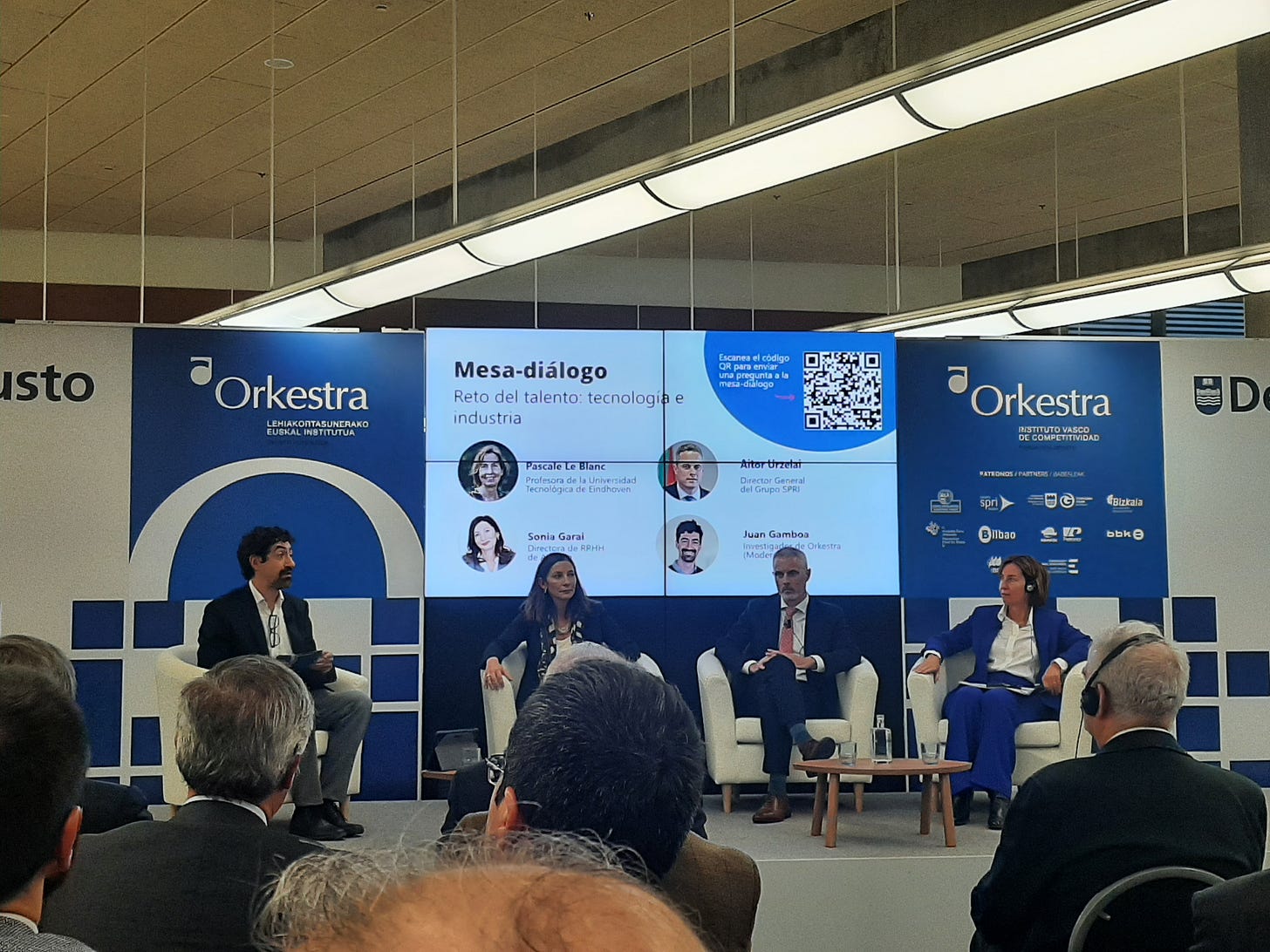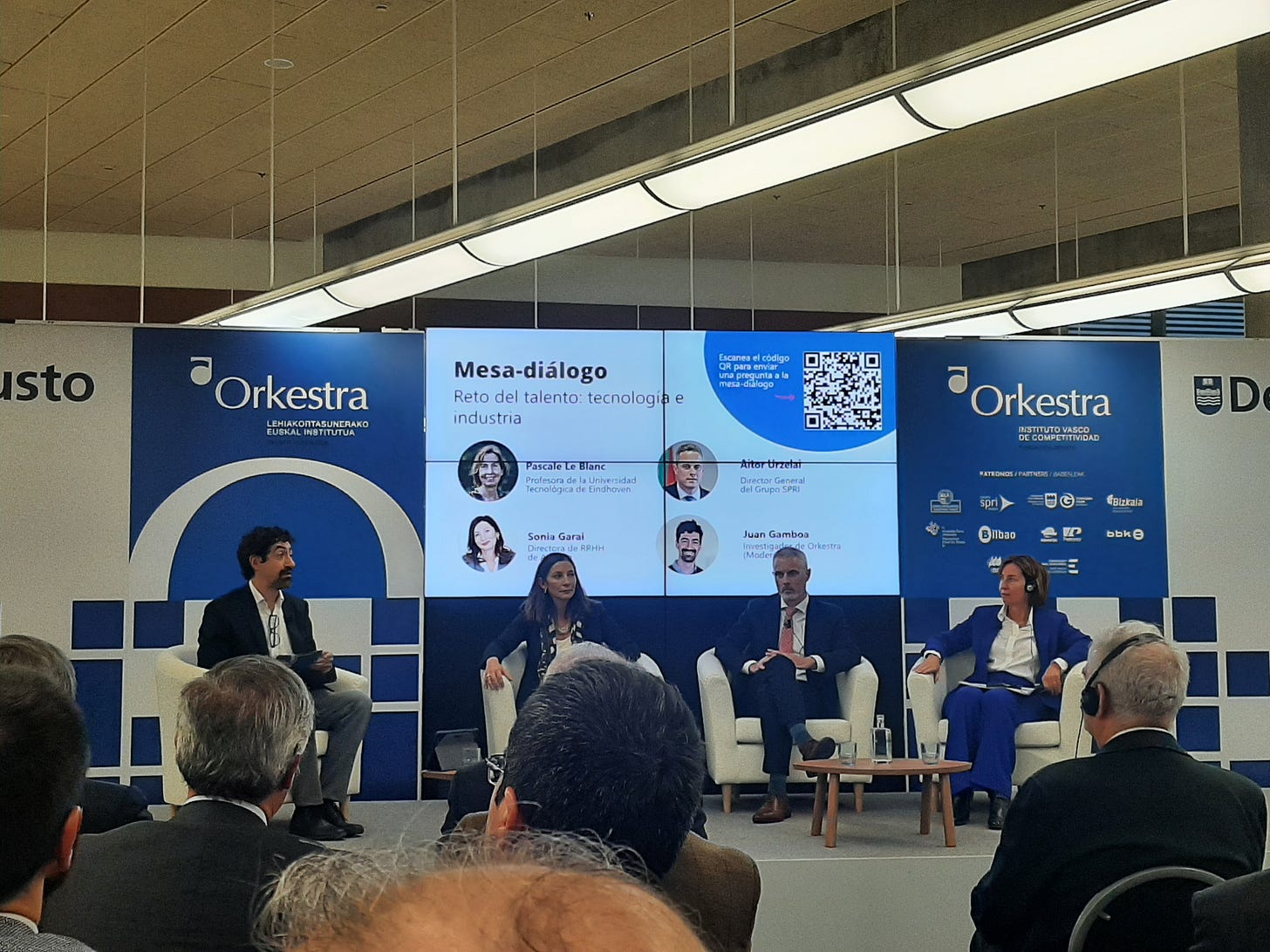54) Informe de Competitividad del País Vasco 2022
“Las bases de la competitividad en una época de incertidumbre” de Orkestra – Instituto Vasco de Competitividad.
Mari Jose Aranguren destacó que la propiedad intelectual en el mundo industrial tomará una relevancia mayúscula, es por ello, que disponer de la actividad protegida mediante una patente nos permitirá asegurar la competitividad al medio plazo. En algunos nichos muy concretos, la concentración de varias patentes en una misma región, aportará una robustez al tejido y garantizará el desarrollo del sector.
La innovación, siempre ha destacado como un factor que aumenta la competitividad , de igual manera la sostenibilidad medioambiental y la digitalización, serán ventajas competitivas en un futuro.
La mejora continua en la intensidad energética (cociente entre el consumo interior bruto de energía y el PIB en volúmenes encadenados) es una vía para descarbonizar la economía y reducir las emisiones de gases de efecto invernadero. De hecho, la intensidad energética de la industria vasca se ha reducido un 30% desde 2013, permitiendo así alcanzar una mayor productividad en el uso de materiales , energía y otros recursos.
El Plan REPowerEU ha establecido la reducción en la dependencia europea a los combustibles fósiles en 45% para 2030, no obstante, parece un objetivo muy ambicioso para convertirlo en realidad. Actualmente, la cuota de energías renovables sobre el consumo final bruto de energía es de 16,9%, cabe resaltar que decena de instalaciones renovables están en fase de tramitación. Todo ello, permitiría seguir desacoplando el crecimiento económico y las emisiones de gases de efecto invernadero.
Felicitar a todos los autores por una radiografía tan precisa en esta época de incertidumbre, ya que este diagnostico recoge parámetros como la recuperación de rentabilidad empresarial, aumento de las exportaciones de bienes y servicios, recuperación del 5,1% de la productividad aparente del trabajo entre otros. En contrapartida remarca el deterioro de los resultados en venta de nuevos productos, % de empresas con alto crecimiento o proporción de pymes innovadoras.
Orkestra-Basque Institute of Competitiveness propone 5 ejes de acción transversales:
1) Fomentar el liderazgo de nueva competitividad industrial sostenible.
2) Fortalecer las capacidades de las personas para contribuir a la competitividad y bienestar.
3) Trabajar la cultura, capacidad y orientación de la innovación.
4) Reforzar un tejido económico sofisticado.
5) Profundizar la conectividad internacional de la economía y la sociedad.
Finalmente, cabe destacar que el modelo desarrollado por Euskadi está generando mucho interés, dado que ha sido el año que más delegaciones extranjeras han visitado la región. Inmejorable señal de un trabajo previo bien hecho.
54) Basque Country Competitiveness Report 2022
"The foundations of competitiveness in a time of uncertainty" by Orkestra - Basque Institute of Competitiveness.
Mari Jose Aranguren stressed that intellectual property in the industrial world will take on major relevance, which is why having the activity protected by a patent will allow us to ensure competitiveness in the medium term. In some very specific niches, the concentration of several patents in the same region will provide robustness to the fabric and guarantee the development of the sector.
Innovation has always stood out as a factor that increases competitiveness, in the same way environmental sustainability and digitization will be competitive advantages in the future.
The continuous improvement in energy intensity (ratio between gross domestic energy consumption and GDP in chained volumes) is a way to decarbonize the economy and reduce greenhouse gas emissions. In fact, the energy intensity of Basque industry has been reduced by 30% since 2013, thus making it possible to achieve greater productivity in the use of materials, energy and other resources.
The REPowerEU Plan has established the reduction in Europe's dependence on fossil fuels by 45% by 2030, however, it seems like a very ambitious goal to make it a reality. Currently, the share of renewable energy over final gross energy consumption is 16.9%. It should be noted that ten renewable installations are in the processing phase. All of this would make it possible to continue decoupling economic growth and greenhouse gas emissions.
Congratulations to all the authors for such a precise x-ray in this time of uncertainty, since this diagnosis includes parameters such as the recovery of business profitability, increase in exports of goods and services, recovery of 5.1% of apparent labor productivity among others. On the other hand, it highlights the deterioration of the results in the sale of new products, % of companies with high growth or proportion of innovative SMEs.
Orkestra-Basque Institute of Competitiveness proposes 5 transversal lines of action:
1) Promote the leadership of new sustainable industrial competitiveness.
2) Strengthen people's capacities to contribute to competitiveness and well-being.
3) Work on the culture, capacity and orientation of innovation.
4) Reinforce a sophisticated economic fabric.
5) Deepen the international connectivity of the economy and society.
Finally, it should be noted that the model developed by the Basque Country is generating a lot of interest, given that it has been the year that most foreign delegations have visited the region. Excellent sign of a previous job well done.






